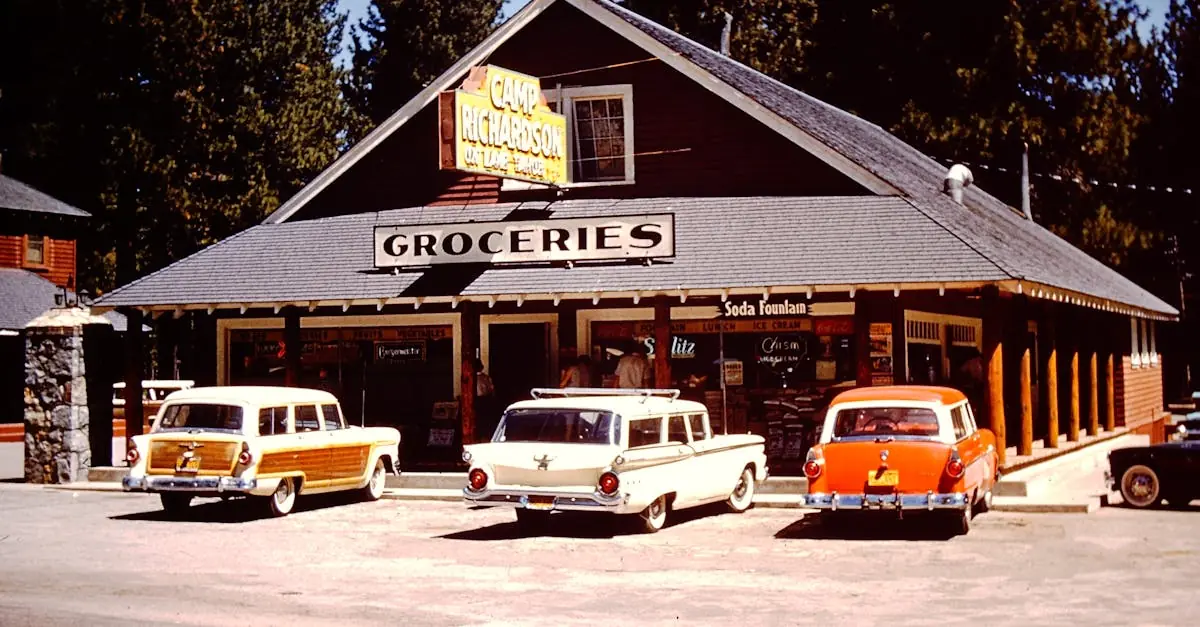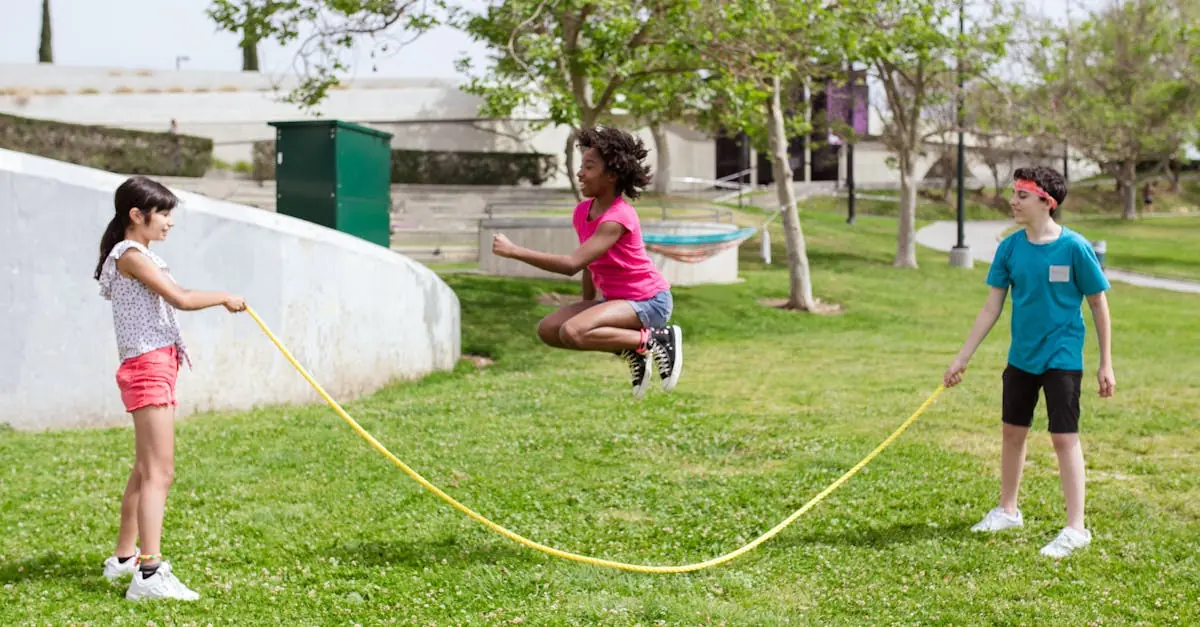Imagine a place where kids can trade their screens for sunshine and adventure. A summer camp for sale isn’t just a property; it’s a gateway to laughter, friendships, and unforgettable memories. Picture the sound of laughter echoing through the trees as children conquer their fears on the ropes course or gather around the campfire, roasting marshmallows and sharing ghost stories.
Table of Contents
ToggleOverview of Summer Camp for Sale
Investing in a summer camp for sale presents unique opportunities for buyers. Potential owners gain access to a ready-made environment where children can learn, play, and grow. Each camp typically features various amenities, such as cabins, recreational areas, and event spaces designed for diverse activities.
Children can experience adventure through hiking trails, swimming pools, and team-building programs. Engaging in these activities fosters lifelong friendships and skills. Camp settings often include dining facilities, which support communal meals and gatherings. Social interactions during meals enhance the overall camp experience.
Acquiring a summer camp also involves understanding the local market. Communities often value these camps for their role in youth development and recreation. Seasonal revenue can be significant, and camps often generate income through programs and rentals year-round.
Most camps come equipped with established programs that appeal to families. Buyers can either maintain existing curricula or introduce new activities tailored to current trends. Outdoor education, arts, and adventure sports are popular among youth and can attract more visitors.
Ultimately, owning a summer camp means providing children with joyful experiences and memorable moments. The legacy of these camps extends beyond property ownership; it creates an environment where children thrive together. Evaluating the location, amenities, and community support remains crucial for prospective buyers. Each factor influences the camp’s potential success and the enjoyment it brings to campers.
Types of Summer Camps Available
Numerous types of summer camps cater to varying interests and needs. Camp owners can choose from day camps, overnight camps, and specialty camps, each offering unique experiences.
Day Camps
Day camps provide children with a full day of fun and activities while returning home each evening. These camps often focus on recreational and educational programs, such as arts and crafts, sports, and team-building exercises. Many parents opt for day camps to accommodate their work schedules while engaging their kids in a structured environment. Facilities typically include outdoor play areas, classrooms, and multipurpose spaces to host various activities. Parents appreciate day camps for their flexibility and convenience, ensuring that children enjoy a summer filled with excitement.
Overnight Camps
Overnight camps immerse children in a distinctive environment, where they stay for one or more weeks. These camps foster personal growth and independence through a range of activities like hiking, swimming, and campfire storytelling. Campers form close bonds with peers while participating in cooperative games and skill-building challenges. Accommodations often feature cabins or tents, creating a sense of community. Parents value overnight camps for promoting lifelong friendships, enhancing social skills, and providing a traditional camp experience that creates lasting memories.
Specialty Camps
Specialty camps focus on specific interests or skill development, catering to various passions. Options include sports camps, arts camps, science camps, and music camps, offering tailored programs that enhance talents and interests. Campers can engage intensely in their chosen activities, often learning from experienced instructors and professionals in the field. The structure of specialty camps allows for in-depth exploration, leading to skill improvement and personal growth. Parents often choose specialty camps to nurture their child’s unique passions while providing a fun and educational summer experience.
Factors to Consider When Buying a Summer Camp
When considering the purchase of a summer camp, several critical factors influence success and enjoyment. Analyzing these aspects ensures a well-rounded decision.
Location
Location significantly impacts attendance and accessibility for families. Camps situated near urban areas attract more children, while those in scenic, remote regions offer a unique outdoor experience. Understanding local demographics helps in tailoring programs to the community’s needs. Proximity to natural attractions enhances the camp’s appeal, inviting campers to explore hiking trails, lakes, and parks. Consider zoning regulations and land use when selecting a site to ensure compliance. Accessibility for transportation and safety should also be prioritized to ensure families feel secure when sending their children.
Facilities
Facilities play a vital role in shaping the camper experience. Quality accommodations, including cabins, bathrooms, and dining halls, contribute to comfort and enjoyment. Outdoor recreational spaces for sports and activities should also be ample, allowing for diverse programming. Storage areas for equipment and supplies enable smooth operations. Amenities like swimming pools, arts and crafts cabins, and campfire areas enrich the camper experience. Upkeeping facilities maintains a positive environment, attracting families and ensuring satisfaction. Assess existing conditions and necessary renovations to prioritize investments effectively.
Programs Offered
Programs offered at a summer camp shape its identity and attract families. Campers benefit from diverse activities encompassing sports, arts, nature exploration, and leadership training. Established programs keep children engaged while allowing room for new offerings based on trends and interests. Investing in experienced staff enhances the quality of activities, fostering skill development and teamwork. Camps with themed weeks or special guest instructors create excitement and draw interest. Understanding community preferences is essential in curating programs that appeal to a wide audience, maximizing participation and satisfaction.
Benefits of Owning a Summer Camp
Owning a summer camp provides various advantages that extend beyond merely acquiring property. The unique experience of managing a camp creates opportunities for personal and financial growth. A summer camp serves as a platform for promoting youth development by offering enriching activities that positively impact children’s lives.
Increased revenue potential stands out as a key benefit. Camps generate income through seasonal programs, rentals, and events. Established programs attract families, ensuring a steady flow of participants. Owners can diversify offerings to appeal to a broader audience, enhancing profitability.
Access to ready-made facilities enhances the investment value. Camps typically include cabins, recreational areas, and dining spaces, reducing initial setup costs. These amenities create a welcoming environment where children can learn and grow. Facilities like swimming pools and sports fields foster engagement in diverse activities.
Building lifelong connections among campers forms another significant advantage. Summer camps create lasting friendships through shared experiences in nature and teamwork. Many campers return year after year, contributing to community strength and loyalty. These connections often extend beyond the camp, providing networks of support.
Flexibility in program offerings allows owners to cater to specific interests. Specialty camps focused on arts, sports, or science enable children to explore passions. These targeted experiences can enrich children’s skill sets while maintaining high participation rates.
Location plays a critical role in overall camp success. Camps situated in scenic areas attract families seeking unique outdoor experiences. Urban proximity increases accessibility, drawing in more participants. Effective marketing strategies can enhance visibility and attract new clients, especially with emphasis on geographical appeal.
Understanding community dynamics ensures program relevance and effectiveness. Gathering feedback helps tailor activities to local preferences, increasing camper satisfaction. Engaging with families fosters a sense of belonging, enhancing community involvement within the camp environment.
Challenges and Risks Involved
Acquiring a summer camp involves various challenges and risks that potential buyers should consider. Financial obligations can arise unexpectedly, including maintenance costs for facilities and equipment. Aging buildings necessitate repairs, which can strain budgets if not anticipated.
Regulatory compliance presents another challenge. Local regulations govern safety standards, land use, and environmental impact. Failure to adhere to these regulations can lead to substantial fines or operational limitations.
Market fluctuations influence attendance, impacting revenue streams. Economic downturns often translate to fewer families willing to spend on summer camp experiences. Seasonal revenue can also vary based on weather conditions, affecting outdoor activities and overall participation.
Liability lawsuits pose significant risks. Accidents can happen during activities, creating potential legal challenges. Adequate insurance coverage is crucial to mitigate this risk, yet securing comprehensive policies can be costly.
Staffing issues arise often in the camp setting. Recruiting qualified personnel can be difficult, especially during peak seasons. Staff training is essential for maintaining safety procedures and program quality but requires upfront investment.
Maintaining marketing efforts is also critical. An appealing marketing strategy is necessary to attract families and differentiate from competitors. If marketing is inadequate, summer camps risk reduced visibility in the community.
Community relations play a pivotal role in a camp’s success. Building trust with local residents enhances the camp’s reputation but requires ongoing engagement. Negative perceptions can quickly develop, underscoring the importance of positive relationships with the surrounding community.
Understanding these challenges allows potential buyers to navigate the landscape of summer camp ownership effectively. Each risk requires proactive strategies, ensuring that the camp can thrive while providing enriching experiences for children.
Investing in a summer camp offers a unique opportunity to create lasting memories for children while fostering personal and financial growth. The joy of providing a space where kids can explore nature and build friendships is invaluable.
However, potential buyers should remain aware of the challenges that come with camp ownership, such as maintenance costs and regulatory compliance.
Understanding the local market and community preferences is essential for success. With thoughtful planning and engagement, owning a summer camp can be a rewarding venture that enriches the lives of countless children for years to come.






